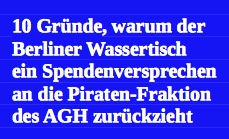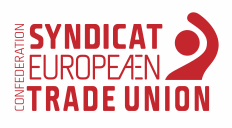Privatsphäre stärkt, Überwachung schwächt! #StopScanningMe


Suche

Schiefergas-Fracking in Deutschland?

#StopEUMercosur Erklärung

Aktion Greenpeace: #StopEUMercosur

#SaveTheOkavangoDelta

Erfolgreich! Über 1 Million Unterschriften „Green Deal“ – Europäische Bürgerinitiative (EBI)

Stop Energiecharta. #NoECT. Wir wollen raus aus dem Anti-Klimaschutz-Vertrag

Europäische Bürgerinitiative gegen biometrische Massenüberwachung (17.2.2021-17.2.2022)

Lebensgefährliche Entwicklung: Gewinnorientierung im Krankenhaus

- Wassertisch-Plenum,
im NewYorck / Bethanien Mariannenplatz 2A
10997 Berlin Openstreetmap fällt coronabedingt aus Überblick (Messstellen: Oberflächengewässer und Grundwasser)


-
Letzte Beiträge
- AöW zum Weltwassertag 2023: Interkommunale Zusammenarbeit noch stärker ermöglichen
- Greenpeace: Fracking – eine unterirdisch schlechte Idee
- Bürgerinitiative gegen CO2-Endlager: Offener Brief an den Bundesminister für Wirtschaft und Klimaschutz Dr. Robert Habeck
- BUND gegen CCS-Endlager
- Jürgen Knirsch: CETA-Handelsabkommen: Eine trügerische Wette auf die Zukunft (Leserbrief an die SZ vom 8.12.2022)
- Neuere Materialien und Dokumente zur CETA-Debatte
- TAZ: Hamburger Abgeordneter über Olympia-Gedankenspiele: „Es kommt zu Vertreibungen“
- NDR: Bewirbt sich Hamburg noch einmal um Olympische Spiele?
- NGO-Bündnis fordert mit gemeinsamen Appell die Senkung des absoluten Ressourcenverbrauchs
- Allianz der öffentlichen Wasserwirtschaft warnt vor CETA: Mit dem jetzigen CETA-Text wird der Schutz der öffentlichen Wasserwirtschaft vor einer Kommerzialisierung weiter geschwächt

Delius-Klage

Keine Steuergelder für LNG-Fracking-Gas Terminals in Deutschland!

RSS-Feeds
Schlagwort-Archive: Wallonie
Friedrich Merz (Vorsitzender der Atlantik-Brücke) ehrt Freeland für ihren CETA-Einsatz
Berlin, 9.12.2018
 Am gestrigen Abend wurde „Kanadas Außenministerin Chrystia Freeland von der Atlantik-Brücke mit dem Eric-M.-Warburg-Preis geehrt. Die Ministerin wurde für ihr großes Engagement um das europäisch-kanadische Handelsabkommen CETA ausgezeichnet“, so die Pressemitteilung der Atlantik-Brücke. Die Laudatio für Freeland hielt Bundesaußenminister Heiko Maas. Friedrich Merz, Vorsitzender der Atlantik-Brücke und (glücklicherweise nur) Beinahe-Bundesvorsitzender der CDU begründete die Wahl damit, dass „ohne das herausragende Engagement von Chrystia Freeland dieses wegweisende Abkommen nicht zustande gekommen“ wäre. Da hat er wohl recht.
Am gestrigen Abend wurde „Kanadas Außenministerin Chrystia Freeland von der Atlantik-Brücke mit dem Eric-M.-Warburg-Preis geehrt. Die Ministerin wurde für ihr großes Engagement um das europäisch-kanadische Handelsabkommen CETA ausgezeichnet“, so die Pressemitteilung der Atlantik-Brücke. Die Laudatio für Freeland hielt Bundesaußenminister Heiko Maas. Friedrich Merz, Vorsitzender der Atlantik-Brücke und (glücklicherweise nur) Beinahe-Bundesvorsitzender der CDU begründete die Wahl damit, dass „ohne das herausragende Engagement von Chrystia Freeland dieses wegweisende Abkommen nicht zustande gekommen“ wäre. Da hat er wohl recht.
Tränen gehen immer. Die Schauspielkünste der Chrystia Freeland
 Wir erinnern uns (nicht gerne) an die Schauspielkünste der damaligen Handelsministerin Chrystia Freeland. Im Oktober 2016 war es der Wallonie unter dem damaligen Ministerpräsidenten Paul Magnette beinahe gelungen, das gefährliche Abkommen zu Fall zu bringen. Das Handelsblatt twitterte aufgeregt: „#CETA steht vor dem Aus. #Kanada bricht die Verhandlungen um das Abkommen ab. #Handelsblatt #EUGipfel #Handelsblatt #Belgien“
Wir erinnern uns (nicht gerne) an die Schauspielkünste der damaligen Handelsministerin Chrystia Freeland. Im Oktober 2016 war es der Wallonie unter dem damaligen Ministerpräsidenten Paul Magnette beinahe gelungen, das gefährliche Abkommen zu Fall zu bringen. Das Handelsblatt twitterte aufgeregt: „#CETA steht vor dem Aus. #Kanada bricht die Verhandlungen um das Abkommen ab. #Handelsblatt #EUGipfel #Handelsblatt #Belgien“
Wir waren alle sehr euphorisch und setzten auf das kleine gallische Dorf. „MerciWallonie“ wurde unsere Losung, Paul Magnette unser „Held“.

Doch am 21. Oktober 2016 bewies Chrystia Freeland ihr schauspielerisches Talent. Freeland „erzählte mit tränenerstickter Stimme vor laufender Kamera, wie traurig sie darüber sei, dass Europa selbst mit einem so freundlichen und geduldigen Land wie Kanada kein Abkommen schließen könnte.“ (Quelle) Sie war damit erfolgreich. Am 28. Oktober 2016 stimmten die EU-Staaten dem europäisch-kanadischen Handelsabkommen offiziell zu.
Später hat Chrystia Freeland dann in den Medien „offenherzig verraten, wie sie in den Verhandlungen mit den Europäern ihre Schauspielkünste eingesetzt hat.“ (Quelle)
CETA kann noch gestoppt werden

Ende 2017 wurde CETA vorläufig in Kraft gesetzt. Schon heute kommen die ersten negativen Folgen des Abkommens ans Tageslicht. Weil die EU-Kommission die Einsicht in wichtige Dokumente verwehrt, hat das Umweltinstitut München vor ein paar Tagen eine Klage vor dem Europäischen Gericht eingereicht. Die taz berichtete darüber. CETA muss noch von den einzelnen EU-Staaten ratifiziert werden. Es besteht also noch eine reele Chance, CETA zu stoppen. Beispielsweise könnte der deutsche Bundesrat CETA zu Fall bringen.
Artikel zum Thema:
- Friedrich Merz und BlackRock: DieAnstalt, November 2018
- John Paul Lepers im Gespräch mit Paul Magnette, früherer Ministerpräsident der Wallonie und Galionsfigur im Kampf gegen CETA. ARTE, 30.10.2017.
- Sujata Dey (Council of Canadians): Paul Magnette. The man who made Chrystia Freeland cry. 5.4.2017.
- Markus Becker, Brüssel: Schauspielerei bei Ceta-Verhandlungen. Kanadas Außenministerin gibt falsche Tränen zu. In: Spiegel, 10.2.2017.
- „Merci, Wallonie! – CETA stoppen!“ Kundgebung vor der Belgischen Botschaft. Berliner Netzwerk TTIP | CETA | TiSA stoppen!, 26.10.2016.
- Eric Bonse: Freihandel zwischen EU und Kanada. Schon wieder Geheimnisse. In: taz, 8.12.2018.
Europäischer Gewerkschaftsbund (ETUC): CETA muss verbessert werden
 ETUC assessment on the EU-Canada Comprehensive Economic and Trade Agreement (CETA)
ETUC assessment on the EU-Canada Comprehensive Economic and Trade Agreement (CETA)
Statement approved at the Executive Committee 14-15 December 2016
- With our capacity for mobilising, European and Canadian trade unions had an influence at the concluding stage of the CETA negotiations. The final version of the agreement does not take account of all our concerns, but improvements have been achieved, particularly about protection of public services, labour rights and the environment. Now it is time for the European trade unions to continue acting and lobbying, together with the Canadian trade unions and the international trade union movement, to further improve CETA and push for a progressive global trade agenda.
- When the full text of CETA was released in February 2016, the ETUC and Canadian Labour Congress thoroughly analysed the deal. The two organisations jointly came to the conclusion that it was not a good deal for workers, and mobilised together with their affiliates and in alliance with a number of civil society organisations, in order to ‘restart a transparent negotiating process aimed at introducing in CETA binding and enforceable provisions that can really address and resolve the concerns that ETUC and CLC have raised’ (from the ‘ETUC and CLC statement on CETA’ adopted on 28 October 2016)[1].
- Despite massive public protests and expert testimony on negative impacts of the agreement, governments in Canada and Europe initially rushed to implement CETA. But thanks to mobilising and lobbying of the ETUC and its affiliates, the ratification process was stopped and improvements have been achieved, via a Joint Interpretative Instrument included in the agreement, together with unilateral declarations by some EU Member States.
- In their joint statement in October, the ETUC and CLC declared that ‘any Declaration or Instrument, to be effective and make a difference to the text of CETA, must be legally binding, having a real impact on the most controversial parts of the agreement, and fully address major concerns that the CLC and the ETUC jointly outlined’. The JII is finally legally binding (in accordance with the Vienna convention on the law treaties) and has taken on board several of our demands.
- Nevertheless, the final result is not fully in line with our expectations, particularly when it comes to some important aspects linked to public services and full enforceability of labour rights. That is why we will continue to call for further improvements in the agreement, by lobbying the European and Canadian institutions on the basis of the recognised ‘mixed status’ of CETA, the provisions in the Interpretative Instrument, and the review clause included in the agreement[2].
- While it is true that the new Investment Court System (ICS) introduced into CETA eliminates some of the worst and most obnoxious elements common to international trade tribunals (ISDS mechanisms) by introducing ethical and conflict of interest standards for tribunals, and the tribunal’s ability to dismiss claims that are without legal merit, it still privileges big multinational corporations, and can be used to intimidate democratic institutions from acting in the public interest.
- Nevertheless, since overwhelming opposition to the ICS in Europe forced the EU to deem CETA a ‘mixed agreement’, this will ensure that the ICS will not be provisionally applied until all EU Member States have ratified the agreement, giving time to challenge the ICS in the European Court of Justice, in the German Constitutional Court, and to lobby Member States not to agree it. In this regard, the ETUC also supported the request of a number of MEPs to refer CETA to the ECJ to check whether ICS was compatible with EU law. Unfortunately, this request did not go through in the European Parliament and it was rejected by an overwhelming majority in the plenary. It would now be up to the Belgian Federal Government to file such a request, as agreed with the Wallonian Parliament, and to the German Constitutional Court to consider it. The ETUC would support this, to bring legal clarity to the issue of ICS and ideally to take it out of the agreement.
- We will continue to work together using all available avenues to further improve the deal, including the opportunities provided by CETA itself through the review clause and the power of co-chairs of the CETA Joint Committee to give binding interpretations of the text. This will be particularly the case when it comes to the most critical issues still pending in the agreement, i.e. ICS, enforcement of rights, protection of public services.
- We will continue lobbying the European Commission, the Canadian Government, and the respective European and Canadian parliaments on these points – and we also urge our national members to lobby their own governments and parliaments to contribute to the improvement of the agreement, as a pre-condition for ratification. In particular, we ask the European Parliament to urge the European Commission to reopen dialogue with the Canadian government, and to put in place any effort to make sure that ETUC’s concerns are fully tackled, in order to make CETA acceptable. Furthermore, in line with the Opinion adopted by the Committee on Employment and Social Affairs on 8 December 2016, we recommend that Parliament decline to give its consent to the proposal for a Council decision on the conclusion of CETA, until such criticism and concerns are effectively addressed.
- We do not consider CETA as a benchmark for any future agreement, as we need to further mobilise and negotiate to improve it. Therefore, we will continue to demand transparency and full involvement of trade unions in the implementation of this agreement and in all future negotiations, including via appropriate representation of trade unions in any advisory groups and committees that are set up.
- The ETUC is in favour of fair and sustainable international trade. The next challenge before us is to build on and improve CETA and all post-CETA trade and investment deals, to ensure they meet a progressive trade model. There is still much more work that needs to be done to build a global progressive trade agenda – but through international solidarity, and working together, unions can reshape globalisation so that it works for all of us.
[1] https://www.etuc.org/press/etuc-and-clc-statement-ceta-more-democracy-fair-and-progressive-trade-agenda#.WDyZ9qIrKRs
[2] The review clause is Article 23.11.5 “The Committee on Trade and Sustainable Development may recommend to the CETA Joint Committee modifications to relevant provisions of this Chapter, in accordance with the amendment procedures established in Article 30.2 (Amendments).”
European Trade Union Confederation | Luca Visentini, General Secretary | Bld du Roi Albert II, 5, B – 1210 Brussels | +32 (0)2 224 04 11 | etuc@etuc.org | www.etuc.org
Stellungnahme als pdf
Rundbrief Forum Umwelt & Entwicklung mit Beiträgen zu TTIP, TiSA, CETA
Forum Umwelt und Entwicklung: Rundbrief IV/2016: Gutes Essen – schlechtes Essen. Strukturwandel wohin? Artikel u.a.: Jürgen Maier: TTIP und TiSA. Handelsabkommen mit Zombi-Status. S. 28–29. Jürgen Knirsch: Erneutes Scheitern. Kein Abschluss eines Abkommens über Umweltgüter [EGA]. S. 36–37. Marie-Kathrin Siemer u. Nelly Grotefendt: Die Wallonie. Gallisches Dorf oder ,pars pro toto‘? S. 38–39. Marie-Luise Abshagen: … weiterlesen
„Merci, Wallonie! – CETA stoppen!“ Kundgebung vor der Belgischen Botschaft
Das Berliner Netzwerk TTIP | CETA | TiSA stoppen! hat anlässlich der Weigerung Walloniens, dem CETA-Vertrag zuzustimmen, kurzfristig zu einer halbstündigen Kundgebung für Mittwoch, 26. Oktober, 12 Uhr vor der belgischen Botschaft aufgerufen.

weiterlesen



 Pressemitteilungen
Pressemitteilungen








